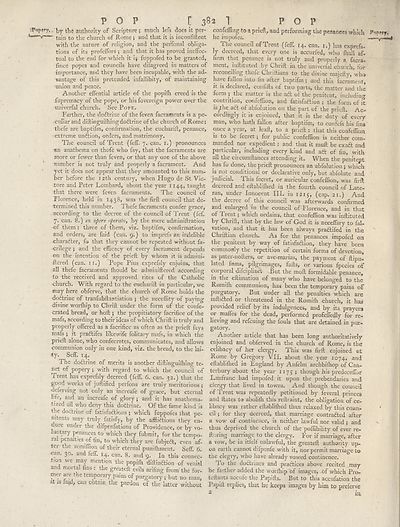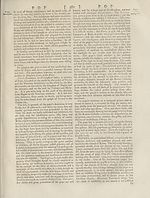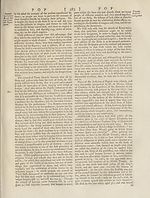Encyclopaedia Britannica > Volume 15, PLA-RAM
(426) Page 382
Download files
Complete book:
Individual page:
Thumbnail gallery: Grid view | List view

POP L ! POP
'P«ref7> by the authority of Scripture ; much left does it per’
‘“““’'Y'-- tain to the church of Rome ; and that it is inconfilient
with the nature of religion, and the peffonal obliga¬
tions of its profeflbrs ; and that it has proved ineffec¬
tual to the end for which it i$ fuppofed to be granted,
iince popes and councils have dilagreed in matters of
importance, and they have been incapable, with the ad¬
vantage of this pretended infallibity, of maintaining
union and peace.
Another effential article of the popifh creed is the
fupremacy of the pope, or hisfovereign power over the
univerfal church. See Pope.
Farther, the doftrine of the feven facraments is a pe¬
culiar and diltinguilhingdo&rine of the church of Rome:
thefe are baptifm, conlirmation, the euchariit, penance,
extreme undtion, orders, and matrimony.
The council of Trent (feff. 7. can. 1.) pronounces
an anathema on thofe who fay, that the facraments are
more or fewer than feven, or that any one of the above
number is not truly and properly a facrament. And
yet it does not appear that they amounted to this num¬
ber before the 1 2th century, when Hugo de St Vic-
tore and Peter Lombard, about the year 1144, taught
that there were feven facraments. The council of
Florence, held in 1438, was the firft council that de¬
termined this number. Thefe facraments confer grace,
according to the decree of the council of Trent (fef.
7. can. 8.) ex opere operato, by the mere adminillration
of them : three of them, viz. baptifm, confirmation,
and orders, are faid (can. 9.) to imprefs an indelible
charadler, fo that they cannot be repeated without fa-
crilege ; and the efficacy of every facrament depends
on the intention of the prieft by whom it is admini-
ftered (can. 11.) Pope Pius exprefsly enjoins, that
all thefe facraments fiiould be adminiftered according
to the received and approved rites of the Catholic
church. With regard to the eucharift in particular, we
may here obferve, that the church of Rome holds the
doctrine of tranfubffantiation ; the necellity of paying
divine worfhip to Chrill under the form of the confe-
crated bread, or holt ; the propitiatory facrifice of the
mafs, according to their ideas of which Chrilt is truly and
properly offered as a facrifice as often as the prielt fays
mats ; it prattifes likewife folitary mafs, in which the
prieit alone, who confecrates, communicates, and allows
communion only in one kind, viz. the bread, to the lai¬
ty. Self. 14.
The dodtrine of merits is another diftinguifiring te¬
net of popery ; with regard to which the council of
Trent has exprefsly decreed (feff. 6. can. 32.) that the
good works of juftified perfons are truly meritorious ;
aeferving not only an increafe of grace, but eternal
hfe, arid an increafe of glory; and it has anathema¬
tized ail who deny this dodtrine. Of the fame kind is
the doctrine of fatisfadtions ; which fuppofes that pe¬
nitents may truly fatisfy, by the afflidtions they en¬
nui e under the difpenfations of Providence, or by vo-
iUntary penances to which they fubmit, for the tempo¬
ral penalties of fin, to which they are fubjedf, even af-
tet the remilfion of their eternal punifhment. Self. 6.
can. 30. and leff. 14. can. 8. and 9. In this connec¬
tion we may mention the popifh diftindtion of venial
and mortal fins : the greatefl evils arifing from the for¬
mer are the temporary pains of purgatory ; hut no man,
is .ard, can obtain the pardon cf the latter without
confeffing to a prieft, and performing the penances which Py^iy.
he impofes. v
The council of Trent (feff. 14. can. 1.) has exprefs¬
ly decreed, that every one is accurfed, who flrall af¬
firm that penance is not truly and properly a facra¬
ment, iaftituted by Chrill in the univerfal church, for
reconciling thofe Chnilians to the divine rnajeily, who
have fallen into fin after baptifm : and this facrament,
it is declared, confifts of two parts, the matter and the
form , the mattei is the adl of the penitent, including
contrition, confeffion, and fatisfadlion ; the form of it
iSjthe adl of abfolution on the part of the prieft. Ac¬
cordingly it is enjoined, that it is the duty of every
man, who hath fallen after baptifm, to confefs his fins
once a year, at lead, to a prie.il: that this confelfion
is to be fecret; for public confeffion is neither com¬
manded nor expedient: and that it mud be exadl and
particular, including every kind and a& of fin, with
all the circumftances attending it. When the penitent
has fo done, the prieft pronounces an abfolution ; which
is not conditional or declarative only, but abfolute and
judicial, ffliis lecret, or auricular confeflion, was firft
decreed and eftablifhed in the fourth council of Late-
ran, under Innocent III. in 1215, (cap- 21.) And
the decree of this council was afterwards confirmed
and enlarged in the council of Florence, and in that
of Trent; which ordains, that confeffion was xnftituted
by Chrill, that by the law of God it is neceffary to fal-
vation, and that it has been always pradlifed in the
Chriitian church. As for the penances impofed on
the penitent by way of fatisfa&ion, they have been
commonly the repetition of certain forms of devotion,
as pater-nollers, or ave-marias, the payment of ftipu-
lated Aims, pilgrimages, fails, or various fpecies of
corporal difciplinc. But the moll formidable penance,
in the eftimation of many who have belonged to the
Rom 1 lli communion, has been the temporary pains of
purgatory. But under all the penalties which are
inflifted or threatened in the Romifh church, it has
provided relief by its indulgences, and by its prayers
or maffes for the dead, performed profeffedly for re¬
lieving and refeuing the fouls that are detained in pur¬
gatory.
Anotner article that has been long authoritatively
enjoined and obferved in the church of Rome, is the
celibacy of her clergy. This was firft enjoined at
Rome by Gregory VII. about the year 1074, and
ellabliflied in England by' Anfelm archbilhop of Can¬
terbury about the year 1175; though his predeceffor
Lanfranc had impofed it upon the prebendaries and
clergy that lived in towns. And though the council
of Trent was repeatedly petitioned by feveral princes
and Hates to abolifh this rellraint, the obligation of ce¬
libacy was rather ellablifiied than relaxed by this coun¬
cil ; for they decreed, that marriage contracted after
a vow of continence, is neither lawful nor valid ; and
thus deprived the church of the polfibility of ever re-
ftoring marriage to the clergy. For if marriage, after
a vow, be in itielt unlawful, the greateil authority up¬
on earth cannot diipenfe with it, nor permit marriage to
the clegry, who have already vowed continence.
To the doctrines and practices above recited may
be farther added the worfhip of images, of which Pro-
te it ants accuie the Papiits. But to this accufation the
Pap iff replies, that he keeps images by him to preferve
2 in
'P«ref7> by the authority of Scripture ; much left does it per’
‘“““’'Y'-- tain to the church of Rome ; and that it is inconfilient
with the nature of religion, and the peffonal obliga¬
tions of its profeflbrs ; and that it has proved ineffec¬
tual to the end for which it i$ fuppofed to be granted,
iince popes and councils have dilagreed in matters of
importance, and they have been incapable, with the ad¬
vantage of this pretended infallibity, of maintaining
union and peace.
Another effential article of the popifh creed is the
fupremacy of the pope, or hisfovereign power over the
univerfal church. See Pope.
Farther, the doftrine of the feven facraments is a pe¬
culiar and diltinguilhingdo&rine of the church of Rome:
thefe are baptifm, conlirmation, the euchariit, penance,
extreme undtion, orders, and matrimony.
The council of Trent (feff. 7. can. 1.) pronounces
an anathema on thofe who fay, that the facraments are
more or fewer than feven, or that any one of the above
number is not truly and properly a facrament. And
yet it does not appear that they amounted to this num¬
ber before the 1 2th century, when Hugo de St Vic-
tore and Peter Lombard, about the year 1144, taught
that there were feven facraments. The council of
Florence, held in 1438, was the firft council that de¬
termined this number. Thefe facraments confer grace,
according to the decree of the council of Trent (fef.
7. can. 8.) ex opere operato, by the mere adminillration
of them : three of them, viz. baptifm, confirmation,
and orders, are faid (can. 9.) to imprefs an indelible
charadler, fo that they cannot be repeated without fa-
crilege ; and the efficacy of every facrament depends
on the intention of the prieft by whom it is admini-
ftered (can. 11.) Pope Pius exprefsly enjoins, that
all thefe facraments fiiould be adminiftered according
to the received and approved rites of the Catholic
church. With regard to the eucharift in particular, we
may here obferve, that the church of Rome holds the
doctrine of tranfubffantiation ; the necellity of paying
divine worfhip to Chrill under the form of the confe-
crated bread, or holt ; the propitiatory facrifice of the
mafs, according to their ideas of which Chrilt is truly and
properly offered as a facrifice as often as the prielt fays
mats ; it prattifes likewife folitary mafs, in which the
prieit alone, who confecrates, communicates, and allows
communion only in one kind, viz. the bread, to the lai¬
ty. Self. 14.
The dodtrine of merits is another diftinguifiring te¬
net of popery ; with regard to which the council of
Trent has exprefsly decreed (feff. 6. can. 32.) that the
good works of juftified perfons are truly meritorious ;
aeferving not only an increafe of grace, but eternal
hfe, arid an increafe of glory; and it has anathema¬
tized ail who deny this dodtrine. Of the fame kind is
the doctrine of fatisfadtions ; which fuppofes that pe¬
nitents may truly fatisfy, by the afflidtions they en¬
nui e under the difpenfations of Providence, or by vo-
iUntary penances to which they fubmit, for the tempo¬
ral penalties of fin, to which they are fubjedf, even af-
tet the remilfion of their eternal punifhment. Self. 6.
can. 30. and leff. 14. can. 8. and 9. In this connec¬
tion we may mention the popifh diftindtion of venial
and mortal fins : the greatefl evils arifing from the for¬
mer are the temporary pains of purgatory ; hut no man,
is .ard, can obtain the pardon cf the latter without
confeffing to a prieft, and performing the penances which Py^iy.
he impofes. v
The council of Trent (feff. 14. can. 1.) has exprefs¬
ly decreed, that every one is accurfed, who flrall af¬
firm that penance is not truly and properly a facra¬
ment, iaftituted by Chrill in the univerfal church, for
reconciling thofe Chnilians to the divine rnajeily, who
have fallen into fin after baptifm : and this facrament,
it is declared, confifts of two parts, the matter and the
form , the mattei is the adl of the penitent, including
contrition, confeffion, and fatisfadlion ; the form of it
iSjthe adl of abfolution on the part of the prieft. Ac¬
cordingly it is enjoined, that it is the duty of every
man, who hath fallen after baptifm, to confefs his fins
once a year, at lead, to a prie.il: that this confelfion
is to be fecret; for public confeffion is neither com¬
manded nor expedient: and that it mud be exadl and
particular, including every kind and a& of fin, with
all the circumftances attending it. When the penitent
has fo done, the prieft pronounces an abfolution ; which
is not conditional or declarative only, but abfolute and
judicial, ffliis lecret, or auricular confeflion, was firft
decreed and eftablifhed in the fourth council of Late-
ran, under Innocent III. in 1215, (cap- 21.) And
the decree of this council was afterwards confirmed
and enlarged in the council of Florence, and in that
of Trent; which ordains, that confeffion was xnftituted
by Chrill, that by the law of God it is neceffary to fal-
vation, and that it has been always pradlifed in the
Chriitian church. As for the penances impofed on
the penitent by way of fatisfa&ion, they have been
commonly the repetition of certain forms of devotion,
as pater-nollers, or ave-marias, the payment of ftipu-
lated Aims, pilgrimages, fails, or various fpecies of
corporal difciplinc. But the moll formidable penance,
in the eftimation of many who have belonged to the
Rom 1 lli communion, has been the temporary pains of
purgatory. But under all the penalties which are
inflifted or threatened in the Romifh church, it has
provided relief by its indulgences, and by its prayers
or maffes for the dead, performed profeffedly for re¬
lieving and refeuing the fouls that are detained in pur¬
gatory.
Anotner article that has been long authoritatively
enjoined and obferved in the church of Rome, is the
celibacy of her clergy. This was firft enjoined at
Rome by Gregory VII. about the year 1074, and
ellabliflied in England by' Anfelm archbilhop of Can¬
terbury about the year 1175; though his predeceffor
Lanfranc had impofed it upon the prebendaries and
clergy that lived in towns. And though the council
of Trent was repeatedly petitioned by feveral princes
and Hates to abolifh this rellraint, the obligation of ce¬
libacy was rather ellablifiied than relaxed by this coun¬
cil ; for they decreed, that marriage contracted after
a vow of continence, is neither lawful nor valid ; and
thus deprived the church of the polfibility of ever re-
ftoring marriage to the clergy. For if marriage, after
a vow, be in itielt unlawful, the greateil authority up¬
on earth cannot diipenfe with it, nor permit marriage to
the clegry, who have already vowed continence.
To the doctrines and practices above recited may
be farther added the worfhip of images, of which Pro-
te it ants accuie the Papiits. But to this accufation the
Pap iff replies, that he keeps images by him to preferve
2 in
Set display mode to:
![]() Universal Viewer |
Universal Viewer | ![]() Mirador |
Large image | Transcription
Mirador |
Large image | Transcription
Images and transcriptions on this page, including medium image downloads, may be used under the Creative Commons Attribution 4.0 International Licence unless otherwise stated. ![]()
| Encyclopaedia Britannica > Encyclopaedia Britannica > Volume 15, PLA-RAM > (426) Page 382 |
|---|
| Permanent URL | https://digital.nls.uk/191906314 |
|---|
| Attribution and copyright: |
|
|---|
| Description | Ten editions of 'Encyclopaedia Britannica', issued from 1768-1903, in 231 volumes. Originally issued in 100 weekly parts (3 volumes) between 1768 and 1771 by publishers: Colin Macfarquhar and Andrew Bell (Edinburgh); editor: William Smellie: engraver: Andrew Bell. Expanded editions in the 19th century featured more volumes and contributions from leading experts in their fields. Managed and published in Edinburgh up to the 9th edition (25 volumes, from 1875-1889); the 10th edition (1902-1903) re-issued the 9th edition, with 11 supplementary volumes. |
|---|---|
| Additional NLS resources: |
|

